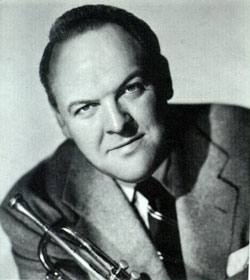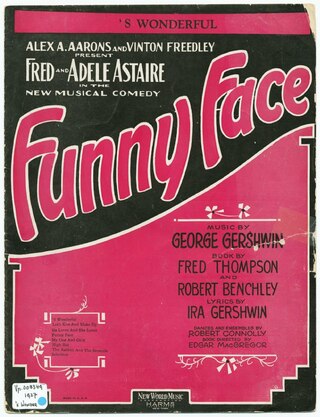Related Research Articles

Edward William May Jr. was an American composer, arranger and trumpeter. He composed film and television music for The Green Hornet (1966), The Mod Squad (1968), Batman, and Naked City (1960). He collaborated on films such as Pennies from Heaven (1981), and orchestrated Cocoon, and Cocoon: The Return, among others.
"Too Darn Hot" is a song written by Cole Porter for his musical Kiss Me, Kate (1948). In the stage version, it is sung at the start of Act 2, and in the 1948 original Broadway production, it was sung by Lorenzo Fuller and Eddie Sledge and Fred Davis, leading the full company.
"All of You" is a popular song written by Cole Porter and published in 1954.
"It's De-Lovely" is one of Cole Porter's hit songs, originally appearing in his 1936 musical, Red Hot and Blue. It was introduced by Ethel Merman and Bob Hope. The song was later used in the musical Anything Goes, first appearing in the 1956 film version ; in the 1962 revival where it was sung by Hal Linden and Barbara Lang, and in the 2004 biographical film De-Lovely, where it was performed by Robbie Williams.
"Don't Fence Me In" is a popular American song written in 1934, with music by Cole Porter and lyrics by Robert Fletcher and Cole Porter. Members of the Western Writers of America chose it as one of the Top 100 Western songs of all time. "Don't Fence Me In" Has also been featured in Bonelab and Fallout
"Always True to You in My Fashion" is a 1948 show tune by Cole Porter, written for the musical Kiss Me, Kate. It is based on Non Sum Qualis Eram Bonae sub Regno Cynarae, a similarly ironic poem by the English Decadent poet Ernest Dowson (1867–1900), which has the refrain 'I have been faithful to thee, Cynara! in my fashion,' and which was probably inspired by Dowson's lifelong friend Adelaide Foltinowicz, who never returned his devotion. The phrase "faithful in my fashion" entered the language before the song was written, and was the title of a 1946 Hollywood film.
"Just One of Those Things" is a popular song written by Cole Porter for the 1935 musical Jubilee.
"Little Girl Blue" is a popular song with music by Richard Rodgers and lyrics by Lorenz Hart, published in 1935. The song was introduced by Gloria Grafton in the Broadway musical Jumbo.

"'S Wonderful" is a 1927 popular song composed by George Gershwin, with lyrics written by Ira Gershwin. It was introduced in the Broadway musical Funny Face (1927) by Adele Astaire and Allen Kearns.
Corky Hale is an American jazz harpist, pianist, flutist, and vocalist. She has been a theater producer, political activist, restaurateur, and the owner of the Corky Hale women's clothing store in Los Angeles, California.
"Who Cares?" is a song composed by George Gershwin, with lyrics by Ira Gershwin, written for their 1931 musical Of Thee I Sing. It was introduced by William Gaxton and Lois Moran in the original Broadway production.
"Down in the Depths (on the Ninetieth Floor)" is a torch song written by Cole Porter, for his 1936 musical Red, Hot and Blue, in which it was introduced by Ethel Merman. The lyric scheme juxtaposes images of high and low. It is a lament from the point of view of a rich woman in a penthouse apartment higher than any building but the Empire State Building, who looks down on the busy city life below her but nevertheless feels she is at the lowest and poorest point of her life because she is lonely. Porter's melody is musically intertwined with the lyric scheme in a similar manner to his song "Ev'ry Time We Say Goodbye."
"Do I Love You?" is a 1939 popular song written by Cole Porter, for his musical Du Barry Was a Lady, where it was introduced by Ronald Graham and Ethel Merman.
"I Am in Love" is a 1953 popular song written by Cole Porter, for his musical Can-Can, where it was introduced by Peter Cookson.
"Ridin' High" is a 1936 popular song written by Cole Porter, for his musical Red, Hot and Blue, where it was introduced by Ethel Merman.
"It Never Entered My Mind" is a show tune from the 1940 Rodgers and Hart musical Higher and Higher, where it was introduced by Shirley Ross.
"(You'd Be So) Easy to Love" is a popular song written by Cole Porter for William Gaxton to sing in the 1934 Broadway show Anything Goes. However Gaxton was unhappy about its wide vocal range and it was cut from the musical. Porter re-wrote it for the 1936 film Born to Dance, where it was introduced by Eleanor Powell, James Stewart, and Frances Langford under its alternate title, "Easy to Love". The song was later added to the 1987 and 2011 revivals of Anything Goes under the complete title "You’d Be So Easy to Love".
"Dream Dancing" is a song written by Cole Porter for the 1941 film You'll Never Get Rich, where it was introduced as an instrumental. The first recording was made by Fred Astaire with Harry Sosnik and his Orchestra and The Delta Rhythm Boys in 1941 under the Decca label (#18188).
"C'est Magnifique" is a 1953 popular song written by Cole Porter for his 1953 musical Can-Can, where it was introduced by Lilo and Peter Cookson. The song become a standard. The only version to chart was by Gordon MacRae which reached No. 29 for one week.
"I Never Had A Chance" is a popular song written by Irving Berlin, published in 1934. Popular versions that year were by Eddy Duchin and by Glen Gray & The Casa Loma Orchestra.
References
- ↑ Mordden, Ethan."Chapter One, 'Coming Up Roses:The Broadway Musical in the 1950s', excerpt" The New York Times on the Web, accessed August 25, 2009.
- ↑ Furia, Philip; Lasser, Michael (2006). America's Songs: The Stories Behind the Songs of Broadway, Hollywood, and Tin Pan Alley. Routledge. p. 224. ISBN 9781135471996.
- ↑ "Discogs.com". Discogs.com. Retrieved May 3, 2020.
- ↑ "Discogs.com". Discogs.com. Retrieved December 27, 2023.
- ↑ "Discogs.com". Discogs.com. Retrieved May 3, 2020.
- ↑ "www.allmusic.com". allmusic.com. Retrieved May 14, 2024.
- ↑ "www.allmusic.com". allmusic.com. Retrieved May 21, 2024.
- ↑ "www.allmusic.com". allmusic.com. Retrieved May 22, 2024.
- ↑ "www.allmusic.com". allmusic.com. Retrieved May 14, 2024.
- ↑ "www.allmusic.com". allmusic.com. Retrieved May 17, 2024.
- ↑ "www.allmusic.com". allmusic.com. Retrieved May 22, 2024.